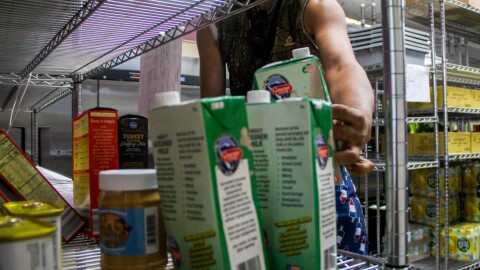A decade on, the Reeb Center still proudly has some vestiges of the former Reeb Avenue School.
Murals of Winnie the Pooh and the Wild Things climb up the large central staircase. In the gym, a spattering of oddly-placed tinted windows throw colors on the wood floor. On the cinderblock wall, in large script, is the word hope.
Reeb Center CEO Ally Zahler called the building a “one-stop shop” for community social services.
“So, the idea is that we house several different organizations in one location so that we're able to build trust with the neighbors and clients," Zahler said.
Thursday afternoon, Zahler and others will celebrate the center's 10th anniversary with a ceremony not unlike the ribbon cutting that opened it a decade ago. Zahler said they'll close down the street and mark the occasion with speeches, pizza, cake and games.

Reeb Center's beginnings
Reeb Center opened in Sept. 2015 after the city of Columbus got the sprawling, three-story Reeb Avenue School in a land swap.
The building had been vacant for several years, but Zahler said it was unscathed — no graffiti clung to the walls, and the windows all remained intact.
She said that's part of the reason then-Mayor Michael Coleman envisioned Reeb as a community hub.
"The building was protected by the neighborhood," Zahler said.
Zahler was the first — and only — staff member brought on, since the building was designed to simply house other organizations.

Now, there’s a host of familiar faces – including a social worker – that neighbors see when they come in. The staff knows their regular clients, and more importantly, the clients know them.
Reeb today
Reeb houses about 10 nonprofits, including the Boys & Girls Club of Central Ohio’s afterschool program, and others that offer harm reduction, mental and behavioral healthcare, and adult education.
Every weekday, 400 to 500 people stop in for a free lunch at Mid-Ohio Food Collective’s café, Zahler said. The café has bright-colored walls and stylish tables. Folks order from a rotating menu.
“They get to have a variety of things that a lot of our neighbors have not had access to. You know, fresh fruits and vegetables, grilled chicken, salad, quinoa, those kind of fun things," Zahler said.
The building also has a new daycare center where about 1,500 “little kiddos” get a good start in life through Columbus Early Learning’s Early Childhood Care Center.

Connecting the dots
The idea behind it all is simple: when people seek one resource, they often actually need several. Reeb Center makes it easy to move between social services without physically going anywhere.
“That's where this model has been so successful and people gain that trust...they're able to come and get multiple resources in one location, instead of getting on a bus, going to the north side, going to west side and trying to navigate the COTA bus," Zahler said.
Zahler also knows that people who live in poverty or struggle with addiction may have a hard time navigating a system that has repeatedly let them down. Even walking into the massive, old school building that is now Reeb can be daunting.
“What we learned late in the game was having a team – an umbrella that helps people navigate those resources – is the key to it," Zahler said.
James, a man who lives on the south side who did not want to give his last name, first came to the Reeb Center a few years ago when he fell behind on his property taxes and was close to losing his home.
Folks at the Reeb Center helped James with that, and then with other problems that cropped up in the interval.
“If you need something and they don't have somebody here that can do it directly, they can usually put you in touch with somebody somewhere that can help," James said. “I believe they do a lot more here now than they did even just a few years ago, more of a variety of service providers and things.”

Changing times - same mission
Zahler admits some things have changed in 10 years, the south side sees a lot of people come and go, after all. During COVID, Reeb staff started seeing more of the neighborhood’s unhoused addiction population, Zahler said.
“We've always been an organization that said we meet people where they are and it's just, that has changed what that looks like over the last 10 years," she said.
When Zahler looks to the future, she wonders how Reeb Center would look with double the services. She also hopes other organizations will replicate Reeb’s model of bringing nonprofits together.
That may happen sooner than later, as Mid-Ohio Food Collective’s Eastland Prosperity Center, is set to be the next example of a social-services hub. It's expected to open next year in what was an abandoned grocery store on Refugee Road.






